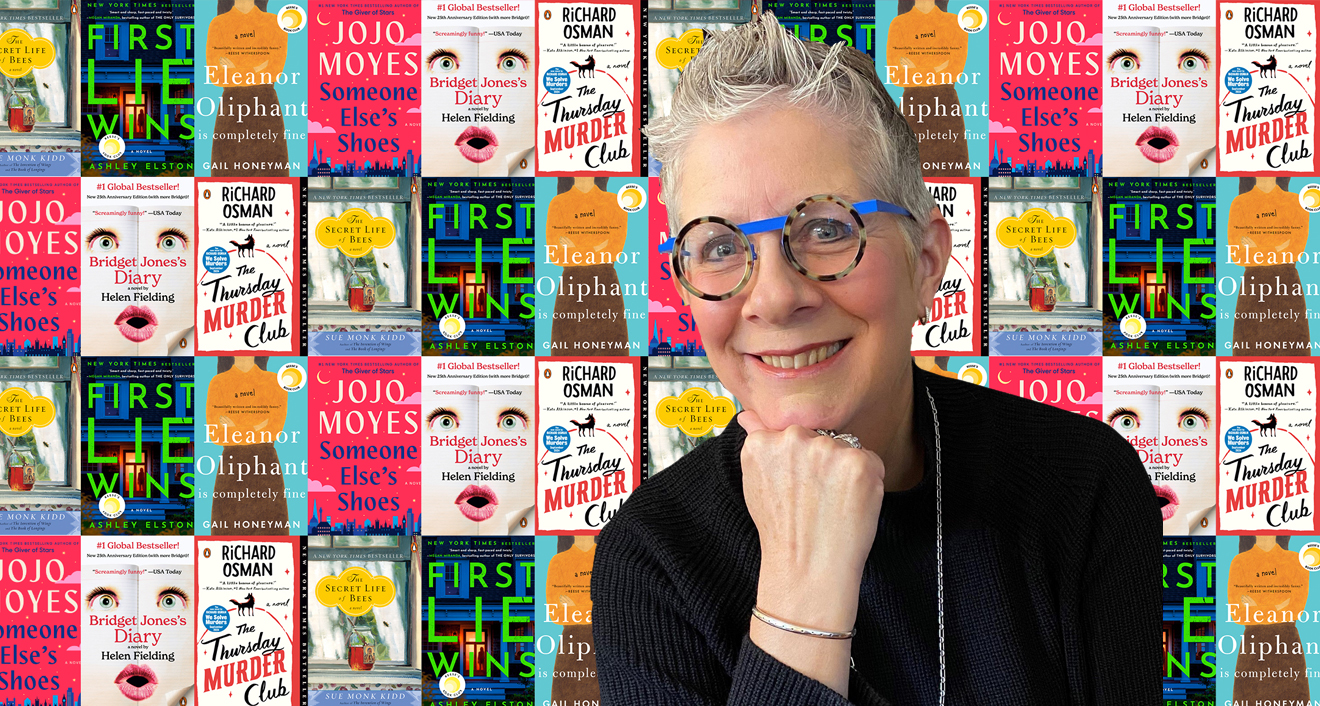
The Book Lover’s Book Editor: Pamela Dorman ’79

Publishing industry veteran Pamela Dorman founded her eponymous imprint, Pamela Dorman Books/Viking, in 2008. Since then, her gift for cultivating debut authors and identifying stories that resonate has propelled her to the top of an industry that has had its share of challenges over the years. Her titles include iconic, genre-defining novels, multi-million-copy New York Times best sellers, and book club darlings, including Bridget Jones’s Diary, The Secret Life of Bees, The Memory Keeper’s Daughter, and First Lie Wins.
In this Q&A with Wesleyan University Magazine Dorman reflects on her long career in publishing, what she looks for in the books she acquires, and the passion and stubborn "doggedness" that fuels her success.
You graduated from Wesleyan in 1979 with a BA in English, summa cum laude, and almost immediately went to work as an editorial assistant at St. Martin’s Press. What did you learn from that first job that you’ve retained throughout your career?
Oh, so much! It was a fantastic place to start because we published a huge number of books a year and I worked on every kind of book—things that I would never read, from celebrity biographies to a diet book for dogs and cats. I came out of Wesleyan; my thesis was on Dante. I didn’t read popular fiction. I didn’t even know what the distinctions between popular and literary fiction were. I got this incredible kind of education in the popular marketplace for what kinds of books were selling, and that is really essential for anybody who is going to work at a trade publisher as an editor or editorial assistant.
Did your studies at Wesleyan prepare you for your future in publishing?
When I went to Wesleyan, I didn’t know what I was going to do with my life, but I knew I was going to work hard and I always knew it was going to be something to do with literature. I worked in the English department as my work study job, so I knew all of those people. I felt steeped in it. What I loved was learning more and more about how to think about literature.
I read Dante in translation. I studied Russian literature (also in translation) with Duffy White. Learning to do that kind of close reading of a text and analyzing it—though that isn’t exactly what an editor does—that kind of close reading definitely prepared me for the line editing that is your stock-in-trade as an editor. Really looking at every word to determine: Is this the right one?
As an acquiring editor, you were responsible for bringing iconic books like Bridget Jones’s Diary to the U.S. market. When that book was published it made such an impact on readers and launched a whole new genre. What was it like to be on the leading edge of a new literary phenomenon?
Bridget and a couple of other books really started what was then termed “chick lit”—a term that author Helen Fielding hated and that was really derogatory. I recently read Bridget again when we were putting together the 25th-anniversary edition, and it still holds up.
On the one hand, I, like many people, hate the term “women’s fiction” because it pigeonholes “women’s” fiction, as opposed to something that anybody else in the world might read. The books that I have published and that have been big, longtime successes—whether it’s The Secret Life of Bees or Eleanor Oliphant or Jojo Moyes’s books—are mostly written by women. But I also publish Richard Osman, whose Thursday Murder Club series has become hugely successful, and in fact, is being produced as a movie by Steven Spielberg and will premiere on Netflix in August. What people love are these characters and how funny the books are, how heartwarming they are. The mysteries are great—but you don’t read them just for the mysteries, you read them for the people.
As the head of your own imprint, you are able to champion all kinds of stories and writers. And your backlist contains an impressive variety of up-and-coming new authors, beloved household names, and even well-known thought leaders. If you were to define what a “Pamela Dorman book” is, how would you characterize it?
I have always said that I’m drawn first by voice, a strong character’s voice, often a woman’s, and by storytelling that is strong and compulsive and readable but written at a high level, where you feel that the writing is part of what makes it a good book. You’re not reading it for the writing as you might a literary novel, but you’re reading it and appreciating the way the author writes, the way they describe a character or a place. That and the characters are a combination that has made most of the big books I have published successful.
You’ve been in publishing for more than 45 years, an amazing achievement because it’s such a challenging business and hardly ever profitable. What’s behind your staying power?
When I read something I want to buy, my husband says that I’m like a schnauzer; I just won’t let go until I get that book. That doggedness has really been my stock-in-trade, for better or worse. That kind of passion and excitement when I read something—it’s almost like this vibrating feeling of “Oh my God, oh my God, this is it! This is great!” That’s how I felt when I read The Names by Florence Knapp. It was an incredible debut that was huge at the Frankfurt Book Fair. Going from “I love this” to persuading my bosses to give me the funds to acquire it, to building the buzz in-house with my colleagues and to the greater world—that is what is so exciting. I love working with authors, particularly new authors. I love helping them make a good book that much better. I could never write a book, but I can almost always help an author make the book the best book it can be.
Can you talk about your process and how involved you are in shaping the story?
Many of my books I will edit a minimum of three times. So, I’ll do the initial read. I’ll send an editorial letter. The first draft, we’ll do another edit, and then I’ll do a final polish. These days, now that my imprint is not just me and an assistant but five people, I share the editorial work with a couple of the other editors. Maybe I’ll do the first edit, and my editor will do the second and third rounds, and I’ll read it over again. But I am in there. That’s why people come to me, because I have a strong reputation for working really hard. What’s really gratifying is that the three other editors who are in the imprint now all started as my assistant. I like to think that I have helped them grow and become editors who know what kind of standards I have and what I think is important in buying the book and then refining it.
That kind of mentorship and passing on what you’ve learned seems ideal and maybe not something that is common these days.
Mentorship has become a more natural part of my job as I’ve gotten older and more crotchety and gotten some more experience. It’s something I enjoy. You know, I still edit on paper. Most people edit on the computer but I can’t do it, so I edit on paper and then my assistant puts it into Track Changes. So, you know, I’m a mixed bag. But both my assistant right now and her predecessor, who is now an editor, said they love doing that because they love seeing the editorial process. And that’s how you learn. That’s how I learned. I saw how the editors I was working with did it and I saw what they said.
Any advice for recent grads who are thinking about going into publishing?
I always say that the best thing you can do is to read the books that are being published now. Read the books that are on the best-seller list because those are the kinds of books you are probably going to end up working on. If that’s not for you, you might want to think again. If you go into publishing, and you do it for a year or two, and you think there’s anything else in the world you would like to do, you should go do it because almost anything pays better and is more secure.
And what would you be doing if you weren’t in publishing?
I really don’t know. I mean, there was never a chance I was going to say, “Oh screw this, I’m going to law school!” I remember very, very clearly at the end of college, I had a stack of graduate school catalogs in my room. It was between going on to graduate school in literature or this idea of working in publishing. I kept looking at that stack and I was like, “I don’t want to do this!” So I just threw them all away. I guess maybe I never had a good plan B. But it’s been fun. It is fun.
The movie adaptation of The Thursday Murder Club will premiere on Netflix on August 28. To see more of Dorman's classic and upcoming titles, visit the Pamela Dorman Books website.




